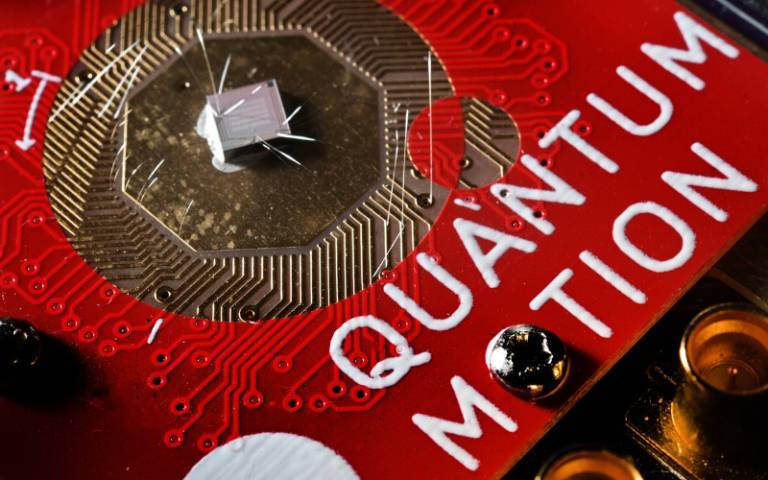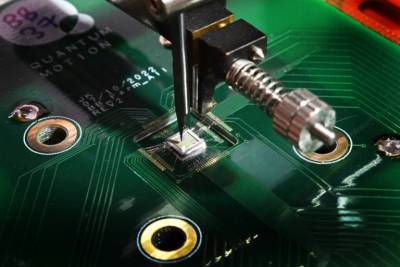UCL spinout raises £42 million to develop quantum processors
2 March 2023
Quantum Motion, a quantum computing spinout led by researchers from UCL and Oxford University, has raised more than £42 million from investors to help develop silicon quantum processors from the laboratory to industrial applications.

The round of investment attracted major technology investors, led by Bosch Ventures (RBVC) and joined by Porsche Automobil Holding SE (Porsche SE) and British Patient Capital. This is on top of more than £20 million raised in earlier investment rounds, from investors that included Oxford Science Enterprises, Inkef, Parkwalk Advisors, Octopus Ventures, IP Group and NSSIF.
Quantum Motion was founded in 2017 by Professor John Morton (UCL London Centre for Nanotechnology) and Professor Simon Benjamin of Oxford University, and is working to develop commercially-available quantum computers using silicon chips.
Professor John Morton (UCL London Centre for Nanotechnology) said: “The new investment will allow Quantum Motion to strengthen its relationship with manufacturing partners, grow its team and facilities, and accelerate the development of scalable quantum processors based on a silicon platform.”
James Palles-Dimmock, CEO of Quantum Motion, said: “The support of leading technology investors enables us to realise our vision of a quantum computer built using standard foundry processes. This support, along with the continuing UK national quantum programme and European initiatives, provides a step-change in our capabilities. We have assembled a world leading team and with the funding and support in place, we are ready to scale and deliver on our vision.”
Quantum computers harness the unusual properties of fundamental particles, like electrons, to make complex calculations that would otherwise be practically impossible to perform, even on today’s supercomputers. This is enabled by processors that use “qubits,” the quantum equivalent of binary bits of information that can exist in multiple states at once. One way to realise such qubits is by trapping individual electrons in tiny regions of a semiconductor device called a quantum dot. The amount of computing power that quantum computing promises could dramatically speed up the formulation of new materials, drug discovery or the complex calculations behind modelling climate change.
Quantum Motion is developing the designs and architecture for qubits and quantum computer chips using industrial silicon chip manufacturing.
Professor John Morton said: “Building high quality quantum processors using the same manufacturing processes that are used to produce billions of silicon transistors on modern computer chips would revolutionise the development of quantum computers. It could bring forward the timescale to achieve quantum processors with the biggest impact, as well as reduce their scale and cost.”

In 2021, researchers at the company made a breakthrough demonstration showing how the quantum state of a single electron could be isolated and measured within a silicon device that had been manufactured in a similar way to the computer chips that power computers and smartphones. Since then the company has been developing the qubit arrays as well as the cryogenic digital and analogue electronics that could someday power quantum processors. In October 2022 they set a world record for the characterisation of an array of 1024 quantum dots on a single silicon chip, occupying an area less than one tenth of one square millimetre, operating at a temperature a fraction of a degree above absolute zero.
In February 2022, the company opened in Islington, north London, its first lab and the largest independent lab of its kind in the UK. The team said that with the new infusion of investment, they hope to triple the size of the facility.
Since its inception, Quantum Motion has worked closely with UCL. The company has been an active partner in the UCL Centre of Doctoral Training in Quantum Technologies, funding nine PhD students at UCL. In addition, Quantum Motion has had access to UCL’s QUES2T facility which provides businesses and researchers access to advanced commercial quantum measurement and fabrication facilities.
Professor John Morton said: “I am very grateful for the enthusiastic support from the Engineering and MAPS faculties at UCL which was instrumental in launching Quantum Motion over five years ago. It’s been brilliant to see the company go from strength to strength since then, setting up its own cryogenic measurement labs, making technical impressive breakthroughs and now realising this major investment.”
Links
- Professor John Morton’s academic profile
- Quantum Motion announcement
- Quantum Motion website
- UCLQ Quantum Science & Technology Institute
- London Centre for Nanotechnology at UCL
- UCL Mathematical & Physical Sciences
- UCL Engineering
Images
- Arrays of quantum dots, courtesy of Quantum Motion
Media Contact
Mike Lucibella
- E: m.lucibella [at] ucl.ac.uk
 Close
Close

